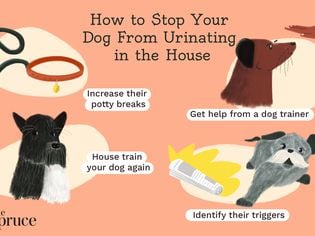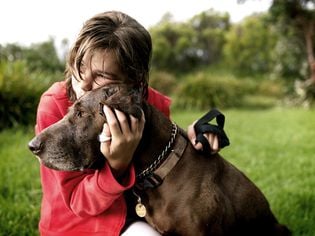How to Train Your Dog to Have Bite Inhibition
A big part of every puppy's early education should involve learning how to use its teeth. Mouthing and biting are natural puppy behaviors, but it&

A dog peeing in the house can be very frustrating, especially when it's a housetrained adult dog. Inappropriate urination is a common issue in dogs that may be caused by a medical or behavioral issue and should be addressed as soon as possible.
The first step is to figure out why your dog is having urinary issues and seek veterinary attention if necessary. Here are some potential reasons why your dog is peeing in the house and what you should do next.
Dogs may pee in the house for several reasons, and it's often called "inappropriate urination" by vets. This is a relatively common problem in dogs that is usually addressed during puppyhood. If your dog is a puppy, then house training might not be complete yet.
If your dog is house-trained and the inappropriate peeing started well after house training was complete, then there are other potential reasons for the behavior. First, rule out health problems before investigating behavioral causes for inappropriate urination.
Here are some common causes of inappropriate urination in dogs:
If your dog suddenly starts peeing in the house (or other unacceptable places), it could be caused by a urinary tract infection. This is a common cause of inappropriate urination and one of the most frequently seen health problems in dogs.
Watch for other signs, such as increased thirst, frequent urination, blood in the urine, and straining to pee. Some dogs will pee in the house after being outside, possibly because they have to go so frequently.
Before you get frustrated, go see your vet for an exam and consultation. Your vet will most likely want a urine sample from your dog to perform a urinalysis and possibly a urine culture. This test is done to look for bacteria and abnormal cells in the urine. If your vet diagnoses a urinary tract infection, the next step is a course of antibiotics.
Other possible urinary issues your vet might find include cystitis (inflammation of the bladder), crystals in the urine, bladder stones, structural abnormalities, a kidney infection, or bladder cancer. Most urinary issues can be treated with medications, supplements, and/or diet changes. In more extreme cases, issues like bladder stones may require surgery.
If your vet doesn't find a urinary tract problem, the next step is to look for other potential health issues.
Urinary incontinence is often associated with senior dogs, but some dogs develop incontinence as young adults. If your dog is leaking or dribbling sporadically, leaving urine puddles in the bed or on the floor during naps, incontinence may be the culprit. It's important to know that your dog doesn't realize it's happening and has no control over it. Fortunately, incontinence can sometimes be treated with medication.
On the other hand, if your dog consciously pees large quantities in inappropriate areas, it's probably not incontinence. Talk to your vet to learn more.
Certain health problems may lead to urinary issues, such as kidney disease, diabetes, and adrenal gland issues such as Cushing's disease. Your dog could be experiencing an injury, joint issues, or arthritis, making it painful for them to get up to go outside for potty breaks. Your vet may recommend additional diagnostic testing to rule out one or more diseases depending on your dog's other symptoms (if any). Treatment will depend on the diagnosis.
Puppies may still have accidents when they're being house-trained, but old age can bring on other causes of urinary accidents. Forms of dementia or senility, called cognitive dysfunction, can occur in aging dogs, leading to house soiling. These dogs may forget their house training or simply forget where they are.
Other health issues, such as kidney failure, tend to crop up in old age as well. This is another reason to get your veterinarian involved early and often. In some cases, dementia can be somewhat managed with medications and supplements. Many people who have senior dogs with urinary issues choose to use doggie diapers or belly bands. You can also line the dog's bedding and other frequented areas with absorbent pads.
Once your vet has ruled out all health issues, you and your dog are likely facing a behavioral issue.
Whatever you do, don't give up on your dog or give your dog away—you can work through this. Of course, you might need to get some additional help. In the meantime, be patient with your canine companion and try taking one or more of these 7 simple steps to help your dog.

A big part of every puppy's early education should involve learning how to use its teeth. Mouthing and biting are natural puppy behaviors, but it&

Raw food diets have become increasingly popular as alternatives to traditional dog food diets. Alongside many other dog food trends like grain-free, v

Nothing is quite as refreshing on a hot summer day as fresh pineapple. Being rich in vitamins and antioxidants, this fruit can be a tasty summertime s

You already know that fruit is important for keeping yourself healthy, but did you know that it’s great for your dog, too? While dogs don’t need fruit

While it may be true that the holidays are the most wonderful time of the year, it’s certainly not the safest time of the year for our dogs! There are

While advances in veterinary medicine are allowing your pet to live a longer, healthier life, the most difficult decision you can make regarding your
We are an information hub dedicated to delivering clear, trustworthy, and engaging content across a wide spectrum of topics — from innovation and trends to daily life, wellness, and global developments.
Our team is passionate about creating content that helps people stay curious, make informed decisions, and understand the world with greater clarity and context.
With a focus on quality, relevance, and accessibility, we aim to offer a meaningful experience for everyone seeking knowledge, ideas, and thoughtful perspectives.